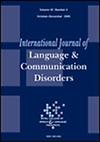The experiences of home-domiciled and international ethnic minority students on a pre-registration speech and language therapy training programme: A qualitative study
Abstract
Background
Attainment inequalities exist for ethnic minority students graduating from higher education institutes (HEIs) in the UK. Previous research has investigated the outcomes and experiences of students from ethnic minority backgrounds on health and social care programmes. However, studies exploring ethnic minority speech and language therapy (SLT) students’ experiences have only focused on international students and were conducted in Australia. No known studies exploring the experiences of both home-domiciled and international SLT students from ethnic minority backgrounds have been conducted in the UK.
Aims
To explore the experiences of home-domiciled and international ethnic minority students on a SLT training programme and to identify ways to improve these experiences.
Methods & Procedures
All SLT students attending a pre-registration postgraduate course who identified as being from an ethnic minority background were invited to participate. Two focus groups, one for three international students and one for six home students, were conducted. Data were analysed using reflexive thematic analysis.
Outcomes & Results
Three themes were identified that illustrated students’ current experiences and how experiences could be improved: (1) feeling an outsider, explores students’ sense of belonging in SLT education; (2) finding ways to manage, describes the strategies used by students to cope with their experiences of marginalization, and how adopting these strategies impact on their well-being; and (3) promoting inclusion, explains how the training programme could be modified to improve the experience of ethnic minority students.
Conclusions & Implications
A better understanding of the experiences of ethnic minority SLT students can help others to support them more effectively. The findings suggest that making changes to SLT training programmes could improve ethnic minority students’ outcomes and experiences. These include: more training for staff and students, support groups for ethnic minority students, sharing lived experiences of students and experienced SLTs from ethnic minority backgrounds, and clearer ways of reporting racist incidents. International students would benefit from receiving more information on HEI support services and cultural practices in the UK.
What this paper adds
What is already known on this subject
- Previous studies have investigated the experiences of ethnic minority students on a range of HEI programmes, including those for students of physiotherapy and occupational therapy. The only studies investigating the experiences of ethnic minority SLT students are those exploring how international SLT students in Australia can be supported on professional placement.
What this paper adds to the existing knowledge
- This study explores the experiences of home and international SLT students in the UK who identify as being from minority ethnic backgrounds. Findings suggest that these students feel like outsiders, affecting their sense of belonging. The need to find and implement strategies to manage their feelings of marginalization impacts on their well-being.
What are the potential or actual clinical implications of this work?
- The findings suggest measures to promote the inclusion of ethnic minority SLT students to improve their experiences and support their well-being. These include more training for all staff and students and the creation of a ‘lived experiences library’ where students and experienced SLTs from ethnic minority backgrounds could share positive experiences as well as ways of dealing with challenges. Clearer ways of reporting racist incidents would be beneficial for all students. International students would benefit from receiving more information on HEI support services and cultural practices in the UK. It is important that ethnic minority SLT students are involved in developments that aim to improve their experiences.

 求助内容:
求助内容: 应助结果提醒方式:
应助结果提醒方式:


